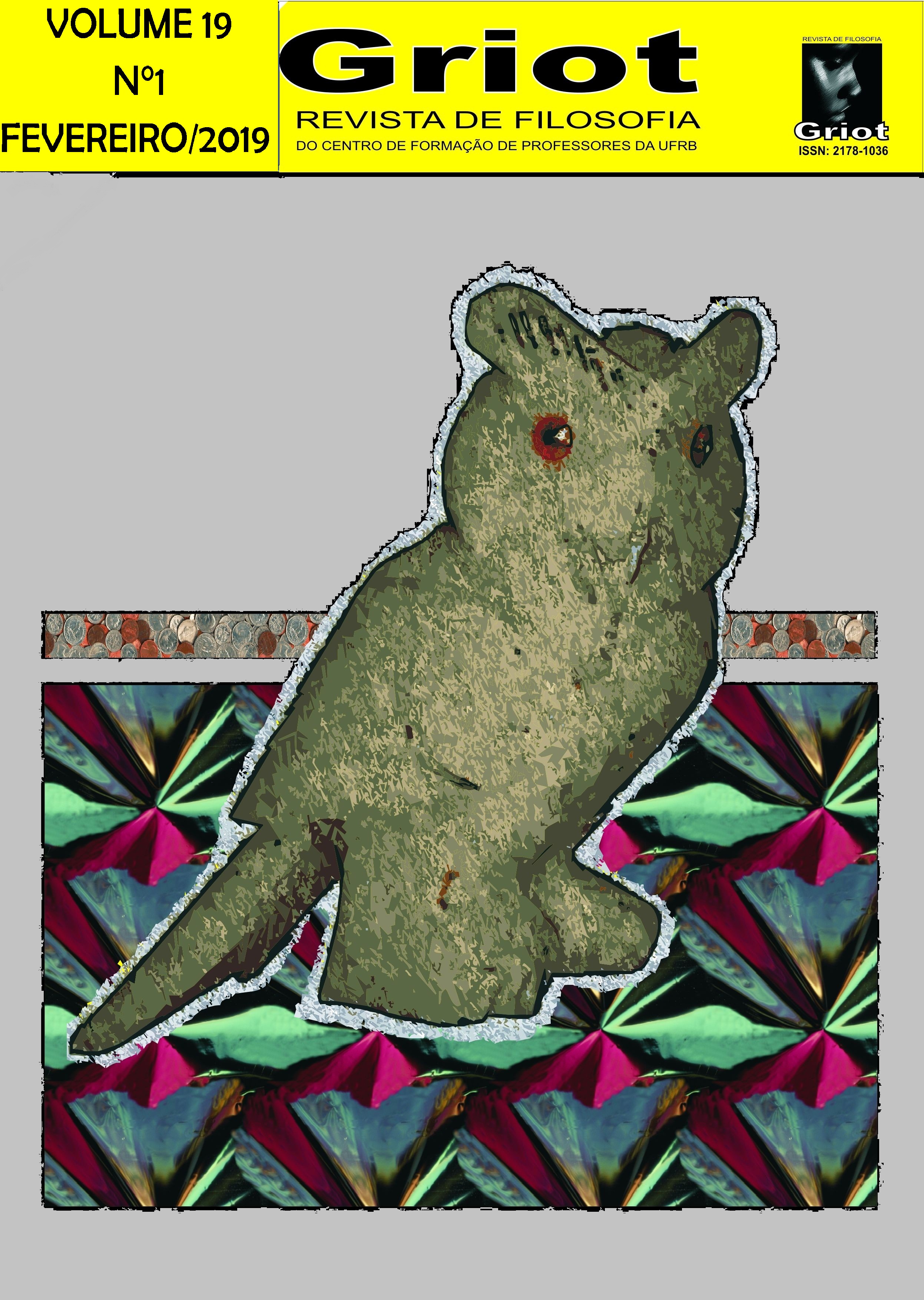Ontology, desire and politics in Spinoza
DOI:
https://doi.org/10.31977/grirfi.v19i1.1031Keywords:
Ontology; Desire; Politics; Spinoza.Abstract
First of all, the article analyzes, in panorama, Spinoza’s ontology. Secondly, it shows how, from the concepts present in the ontology, the author derives others, as man, desire, joy and sorrow, hope and fear, security and despair, action and passion. From the relationship between ontology, men and desire – as well as from the other affects –, are extracted, in brief considerations, some Spinoza´s political thesis. In this argumentative movement, the hypothesis is that many Spinoza’s political thesis arise from its ontology and its conception of man as desire and potency variation. The concept of desire is analyzed in the light of the variation of potency and the theme of natural right, which in Spinoza is identical to potency. When the subject is the brief derivations to politics, some hobbesian thesis – related to the following subjects, namely, the multitude, the people, the representation, the natural right, the civil state, etc. – are brought to show, by contrast, the importance of Spinoza’s innovations.
Downloads
References
ANDRADE, Fernando Dias. Pax Spinozana: direito natural e direito justo em Espinosa. Tese apresentada ao Departamento de Filosofia da FFLCH-USP. São Paulo: 2001.
ASSIS, Machado de. Casa Velha. Rio de janeiro: ed. Paz e Terra, 1986. Disponível em: http://www.dominiopublico.gov.br/download/texto/bv000168.pdf. Acesso: 04 JAN 2019.
AURÉLIO, Diogo Pires. Imaginação e Poder: Estudo sobre a Filosofia Política de Espinosa. Lisboa: edições Colibri, 2000.
BAYLE, Pierre. Dictionnaire historique et critique. Article Spinoza. Disponível em: http://www.spinozaetnous.org/telechargements/Commentaires/Bayle/Bayle_Spinoza.pdf. Acesso: 15 DEZ 2017 [1696].
CAMPOS, André Santos. Ius sive potentia. Individuação jurídico-política na filosofia de Spinoza. Tese apresentada ao Departamento de Filosofia da Faculdade de Letras da Universidade de Lisboa. Lisboa, 2008.
CHAUI, Marilena. A nervura do real: imanência e liberdade em Espinosa. Vol. I: Imanência. São Paulo: Companhia das Letras, 1999.
CHAUI, Marilena. “A estrutura retórica do verbete Spinoza”. In: Kriterion, n. 120, Dez/ 2009, pp. 313-334.
DELEUZE, Gilles. Spinoza et le problème de l`expression. Paris: Les éditions de Minuit, 1968.
DELEUZE, Gilles. Spinoza - Philosophie Pratique. Paris: Les Éditions de Minuit, 1981.
DELEUZE, Gilles. Espinosa: Filosofia prática. Tradução Daniel Lins e Fabien Pascal Lins. São Paulo: ed. Escuta, 2002.
DELEUZE, Gilles. Cursos sobre Spinoza (Vincennes, 1978-1981). Seleção e Introdução de Emanuel A. R. Fragoso e Hélio R. C. Júnior. Tradução Emanuel A.R. Fragoso; Francisca E. B. de Castro, Hélio R. C. Júnior, Jefferson A. de Aquino. Fortaleza: ed. UECE, 2009.
ESPINOSA. Spinoza Opera. Ed. de Carl Gebhardt. Heidelberg: Carl Winter, 4 vols, 1972 [1ª ed. 1925].
ESPINOSA. Correspondência [edição parcial da correspondência]. Tradução de Marilena Chaui. Coleção Os Pensadores. São Paulo: Abril Cultural, 1973.
ESPINOSA. Correspondencia. Introducción, traducción, notas e índices de Atilano Domínguez. Madrid: Aliança editorial, 1988.
ESPINOSA. Ética. Tradução de Tomaz Tadeu. Edição bilíngue (Latim-Português). Belo Horizonte: Autêntica, 2008.
ESPINOSA. Ética. Tradução do Grupo de Estudos Espinosanos, da FFLCH USP. Edição bilíngue (Latim-Português). São Paulo: ed. EDUSP, 2015.
ESPINOSA. Tratado Teológico-político. Tradução, introdução e notas de Diogo Pires Aurélio. São Paulo: Martins Fontes, 2003.
ESPINOSA. Tratado Político. Tradução, introdução e notas de Diogo Pires Aurélio. São Paulo: M. Fontes, 2009.
HOBBES. Leviatã ou matéria, forma e poder de um Estado Eclesiástico e Civil. Tradução de João Paulo Monteiro e Maria Beatriz Nizza da Silva. Coleção Os Pensadores. São Paulo: Abril Cultural, 1997.
HOBBES. Do Cidadão. São Paulo: Martins Fontes, 2002.
HOBBES. De Cive. Edição de Howard Warrender. Oxford: Oxford University Press, 1983.
LUCCHESE, Filippo Del. Conflict, Power, and Multitude in Machiavelli and Spinoza: tumult and indignation. New York/London: ed. Continuum, 2009.
MAQUIAVEL. O Príncipe. Edição bilíngue. Tradução de José Antônio Martins. São Paulo: ed. Hedra, 2011.
MAQUIAVEL. Il Principe. A cura de Luigi Firpo. Torino: Einaudi, 1961. Disponível em: http://www.letteraturaitaliana.net/pdf/Volume_4/t324.pdf. Acesso: 04 JAN 2019.
MATHERON, Alexandre. Individu et communauté chez Spinoza. Paris: Les Éditions de Minuit, 1988.
MONTANS BRAGA, Luiz Carlos. Trama afetiva da política: uma leitura da filosofia de Espinosa. Curitiba: ed. Prismas, 2016.
MORFINO, Vittorio. Le Temps et l'Occasion: la rencontre Spinoza-Machiavel. Tradução de Lucile Langlois e Maxime Giglio. Paris: Garnier, 2012.
NEGRI, Antonio; HARDT, Michael. Império. Rio de Janeiro: ed. Record, 2001.
NEGRI, Antonio; HARDT, Michael. Multidão: guerra e democracia na era do império. Rio de Janeiro: ed. Record, 2005.
NIETZSCHE, F. “Carta sobre Espinosa”. Tradução e introdução de Homero Santiago. In: Cadernos Espinosanos 16. São Paulo, FFLCH USP, 2007, pp. 131-137, p. 137.
ORWELL, George. 1984. Tradução de Alexandre Hubner e Heloisa Jahn. São Paulo: Companhia das Letras, 2009.
Downloads
Published
How to Cite
Issue
Section
License
The authors who publish in Griot: Revista de Filosofia maintain the copyright and grant the magazine the right of first publication, with the work simultaneously licensed under the Creative Commons Attribution 4.0 International License, allowing sharing and adaptation, even for commercial purposes, with due recognition of authorship and initial publication in this journal. Read more...









































































